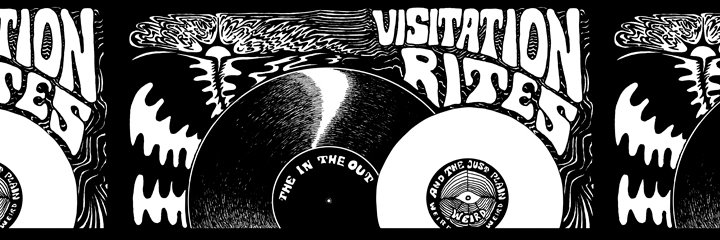
Just when our ears had stopped ringing from the thunderous performances of Sunburned Hand of the Man and Jackie O’Motherfucker at Yamoy’s Soy Festival last fall, the ecstatic sound of the American psychedelic Underground returned to the Nantes last Friday with Tom Carter and GHQ –this time, however, in one of its gentler incarnations.
Friday March 21st, Nantes. The Grimault, a cramped, dim, saloon-style bar tucked away along the Eastern bank of the Erdre, was packed by 8pm. Tom Carter (Austin, Texas) and two of the members of the New York trio GHQ (Marcia Basset and Steve Gunn) sat down to dinner at around 9 and picked leisurely at their salads as they conversed over the din of an increasingly impatient crowd. The two-hour delay between the announced time of the concert and Carter’s arrival on stage set the tone for the evening – Carter and GHQ offer us a music that is patient, unhurried, a sonic exaltation accessible only those who know how to sit down, tune in, and drop out (of waking reality) for an hour or two.
Hypnotic, yes. But repetitive, static, minimal, no. The poster for the soirée, which was coordinated by Yamoy, perhaps sells Tom Carter (Kranky) a bit short with its label of "psychedelic drone". Far from creating a music based on the repetition of static notes (drone, in the traditional sense), this Texan guitar wizard brocades a rich tapestry of extraterrestrial sounds and fleeting melodic inflections. His improvisation-based compositional process hinges on the vertical layering of sounds through looping, reverb and delay–a process no doubt facilitated by the bird’s nest of pedals, mixers and loop-stations at his feet.
At the heart of Tom Carter’s music lies a fascination with the acoustical possibilities of the guitar—not as a single instrument, a single voice, but as a multitude of voices, all waiting to be discovered through a little expert handiwork. The hypersensitive minefield created by his use of various electronic devices allows him to experiment with novel ways of coaxing the sound of out of his instrument – at points, he "plays" his guitar simply by fluttering a finger over the strings near the bridge, hitting the body of the guitar with his left hand, or, at extremely quiet moments, by abandoning the right hand altogether and simply placing his fingers on the frets. What results is a breadth of tones ranging from wah wah to baby’s breath, from Chinese violin to bells, a diversity so surprising that the listener is bound to wonder whether his long-time collaborator Christina Carter (Charalambides) isn’t hiding somewhere backstage.
But Carter doesn’t experiment for experimentation’s sake alone. Rather, he undertakes these acoustic explorations with the aim of enriching his melodic transports. His goal is less to show us which sounds he can pull out of his instrument than to show us what a given sound can do. The result is a hallucinatory counterpoint of echoes and faraway melodies, a music that scatters throughout the room and gathers in corners before dissolving into the air.
Next up, Marcia Basset and Steve Gunn of GHQ (Three Lobed). Bassett (Double Leapords, Hototogisu, Zaimph), shrouded in a generous cascade of long blond hair, drones away raga-style on a ragged-looking viola, while Gunn (Moongang, Magik Markers) summons a few glistening gemstones from his electro-acoustic guitar. They are New Yorkers, sure, but their music is as far removed from that land of subway trains, flashing lights, 24-hour bodegas and Dow Joneses as we are, over here, on the other side of the Atlantic—perhaps even further. Evoking the title of their most recent full-length album, Crystal Healing (2007), their music insinuated itself into the two rooms of the Grimault like a heady, medicinal incense, bringing with it florals and musks from lands as far and wide as East Asia and the deep South, Appalachia and Persia.
Here, as in the music of Tom Carter, reverb and delay reign supreme. GHQ’s instrumentation (viola and guitar, guitar and guitar, guitar and voice) is deceptively sparse; heavy distortion, like witchcraft, transforms whatever two instruments they might happen to be using at any given time into several. Basset, clutching her viola to her chest, summons an unearthly tremor with the wood of her bow—an Indian sound, the sound of a Sitar, no, of a dozen Sitars playing at once. Her cyclical riffing, restricted to a limited number of notes (one of the foundations of the Indian Raga) confirms this evocation of the far East, while Gunn’s melodic picking transports us into yet another mind-state: John Fahey takes a trip to the Orient and weaves strains of the local music he encounters into an ode to the country that he loves, lowering his hat to Sir Richard Bishop and his Spanish guitar along the way.
In Gunn’s playing, we encounter a sound that cannot be called anything other than American; not "American" in the sense of the America of the present, but "American" in the sense of an America removed, a wide open, fecund, honky-tonk America of yore, trapped beneath the rubble of distance and time. And while we cannot decipher the adventure stories he recounts when he steps up to the mic, we hear the ghosts of dead, pre-war bluesmen welling up from his voice. Gorgeous.
Like many of the other artists who fall under the somewhat pell-mell category of the "New Weird America," Tom Carter and GHQ provide a compelling, homegrown antidote to modern occidental life. And even if it is hard to say exactly where their music transports us, when it transports us, we can rest assured it is not here. Oh no, not here.
Words: Emilie Friedlander, 2008
French version available on Fragil.org, a Nantes-based online cultural magazine. Link to original article here.

Like what we're doing here? Just a little pocket change gives Visitation Rites food to live on.




